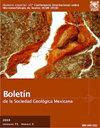墨西哥恰帕斯州中新世琥珀中的第一个分裂蝶科化石(半翅目:异翅目)
IF 0.4
4区 地球科学
Q4 GEOLOGY
引用次数: 0
摘要
本文以一个雌性标本为基础,描述了一个新属和一个新种,即Hypsotsijilia bretoni Cifuentes Ruiz和Brailovsky gen.nov.,sp.nov。它代表了墨西哥恰帕斯州中新世早期琥珀中第一个裂殖蛛科化石记录。将其与相关分类群进行了比较,并讨论了河口古环境,与之前在其他河口琥珀矿床中引用的亚科相匹配。本文章由计算机程序翻译,如有差异,请以英文原文为准。
First fossil Schizopteridae (Hemiptera: Heteroptera) in Miocene amber from Chiapas, Mexico
A new genus and species of Hypselosomatinae (Heteroptera: Dipsocoromorpha), Hypsotsijilia bretoni Cifuentes-Ruiz and Brailovsky gen. nov., sp. nov. is herein described based on a female specimen. It represents the first fossil record of Schizopteridae in the early Miocene amber from Chiapas, Mexico. It is compared with related taxa and the estuarine paleoenvironment is discussed, matching the one previously cited for the subfamily in other estuarine amber deposits.
求助全文
通过发布文献求助,成功后即可免费获取论文全文。
去求助
来源期刊
CiteScore
1.40
自引率
12.50%
发文量
34
审稿时长
50 weeks
期刊介绍:
The Boletín de la Sociedad Geológica Mexicana is a completely free-access electronic journal published semi-annually that publishes papers and technical notes with its main objective to contribute to an understanding of the geology of Mexico, of its neighbor areas, and of geologically similar areas anywhere on Earth’s crust. Geology has no boundaries so we may publish papers on any area of knowledge that is interesting to our readers.
We also favor the publication of papers on relatively unfamiliar subjects and objectives in mainstream journals, e.g., papers devoted to new methodologies or their improvement, and areas of knowledge that in the past had relatively little attention paid them in Mexican journals, such as urban geology, water management, environmental geology, and ore deposits, among others. Mexico is a land of volcanos, earthquakes, vast resources in minerals and petroleum, and a shortage of water. Consequently, these topics should certainly be of major interest to our readers, our Society, and society in general. Furthermore, the Boletín has been published since 1904; that makes it one of the oldest scientific journals currently active in Mexico and, most notably, its entire contents, from the first issue on, are available online.

 求助内容:
求助内容: 应助结果提醒方式:
应助结果提醒方式:


